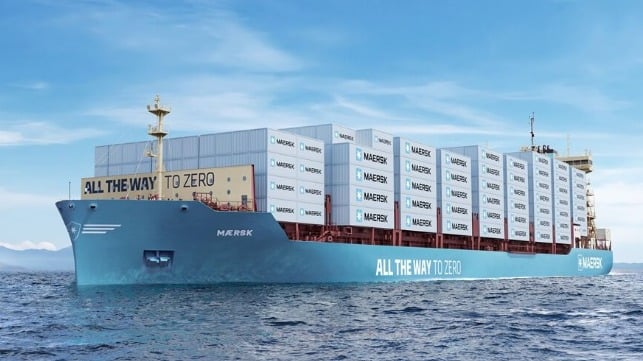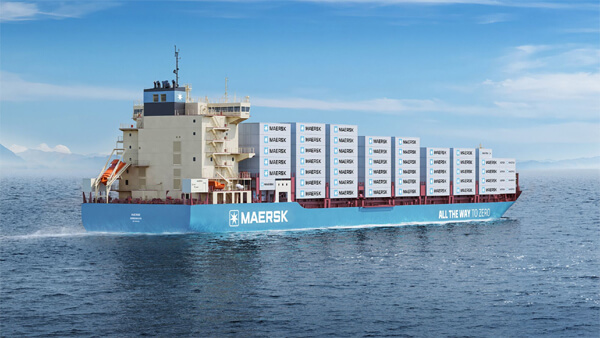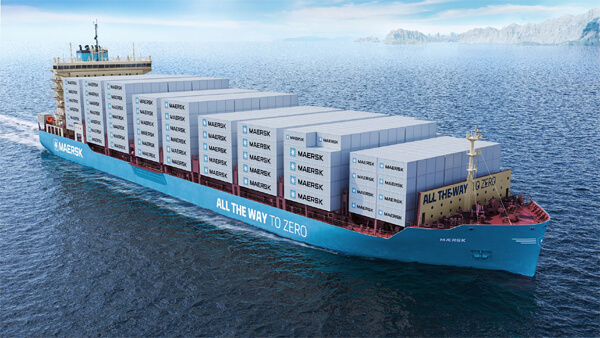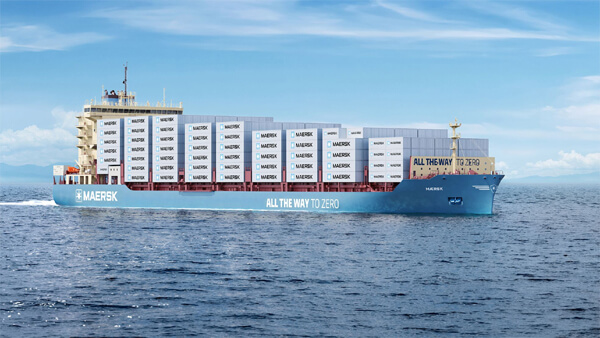Maersk Unveils Pioneering First Methanol-Fueled Container Feeder

Maersk unveiled the designs for its pioneering methanol dual-fuel container feeder in social media posts today. The shipping giant revealed the first renderings of the ship which is expected to launch a new era for container shipping as the first vessel in the sector to operate on the green fuel and one of only 25 methanol-fueled ships currently in operation.
The first vessel was viewed as a trailblazer when Maersk announced its intentions in February 2021 and confirmed the construction order with South Korea’s Hyundai Mipo Dockyard in July 2021. So far, the company has only provided a few basic details saying that it would be a feeder ship to operate on its routes in the Baltic. It is 564 feet long with a 105-foot beam with a nominal capacity of 2,100 TEU including 400 reefer plugs.
The renderings show that it is a conventional design with an aft deckhouse for navigation and the accommodation block. The methanol tank, unlike some LNG tanks, is below deck. One visible feature from the rendering is boxes labeled “shore power” which appear to give the vessel cold ironing capability. Also, Maersk is evolving its livery and branding to highlight the vessel’s pioneering role. Painted on the hull is the slogan “All The Way to Zero,” which Brian Borup, Senior Brand and Design Manager, says was selected to highlight the decarbonization efforts.

Boxes at the rear are labeled "shore power" (Maersk)
”Developing this vessel is a significant challenge, but we have already come a long way in our work with the yard and the makers to reach this milestone,” said Ole Graa Jakobsen, Head of Fleet Technology, A.P. Moller – Maersk when the order was placed in 2021. “While we are pioneering these solutions for our industry, we are working with well-proven technologies and the cost potential from further scaling is becoming very clear to us.”
Propulsion for the ship is a MAN 6G50-LGIM main engine and methanol capable gensets that were being developed in a partnership between MAN Energy Solutions and Hyundai Engine and Machinery for the main engine and Himsen for the auxiliary engine. The plant was designed to operate on either methanol or traditional very low sulfur fuel. When the order was placed, Maersk said the limiting factor in vessel design was the engine while also commenting that the methanol-capable engine was costing 15 percent more than a traditional engine for the ship. They however said with the technology in place it would provide a model that would only require engineering to scale up.
The design project they noted was providing important information in the development of the propulsion plant and engineering for methanol systems. Maersk said they expected to gain operating experience from the vessel which would also be vital to the later ships.

“I am very happy with the progress we are making on the project,” said Jakobsen today while revealing the renderings. “We have now completed all key design-related milestones and production is progressing at full speed with delivery expected during summer. It has been a huge project, but we have succeeded not least due to great collaboration internally in Maersk and with our external partners.”
Work is also underway on Maersk’s first class of dual-fuel large containerships. The first steel cuts began late in 2022 for the 16,000 TEU methanol containerships which are due to enter service starting in 2024. In total, Maersk has 19 methanol-fueled containerships on order.

that matters most
Get the latest maritime news delivered to your inbox daily.
The ships are seen as the first wave of the industry’s next generation which is expected to grow quickly. DNV currently reports that 68 of the 81 methanol-fueled vessels on order and due for delivery by 2028 are container vessels. Senior Consultant Martin Wold noted at year’s end that methanol had reached a 13 percent share of alternative fuel orders in record time. Last month, he noted that methanol “stole the spotlight” with the orderbook continuing to grow and he has commented that “the pipeline is building” with the expectation that methanol will emerge as the next leader in alternative fuels.

